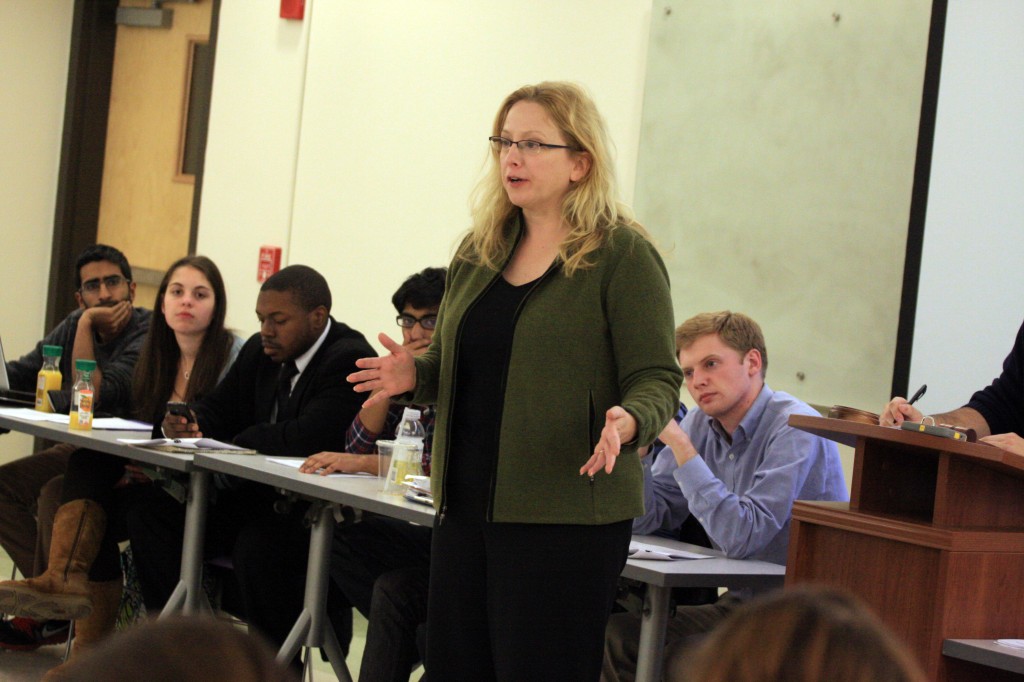
The Student Congress was given an opportunity to air its grievances to Dean of Students April Thompson on Monday night, bringing up issues of transparency and disciplinary action.
Multiple SC members expressed support for increased transparency by committees and other administrative bodies that are supposed to work for the benefit of the student body. Thompson sits on several committees, including the Personal Safety Advisory Committee. She is the chair of the Students of Concern Committee and used her experience sitting on these bodies to answer questions about what goes on behind closed doors. Members said they supported a mechanism for students to challenge disciplinary action that they feel is unjust, including instances of alcohol possession in residential communities.
“My RAs are allowed to say whatever they want with no accountability,” said Dan Greenberg, a junior triple-majoring majoring in finance, mathematics and computer science. “How do I — as a student — hold [RAs] accountable?”
Thompson responded that students have the ability to go to resident directors and other administrative supervisors when they feel a resident assistant, or anyone else in a position of power, has acted inappropriately. She also added that administrators are discussing changes in disciplinary processes with students.
“To have an adversarial relationship with the Student Congress is bad for everybody,” Thompson said.
Thompson said that she was open to creating a new system that would hold administrators as well as students accountable. She specifically mentioned a pilot program she said she would like to initiate; the program would create an all-student disciplinary committee for each residential community that would deal with issues like underage alcohol possession. Instead of going before a resident director, the proposed program would allow students to answer to a committee of their peers. According to Thompson, the idea for the program came from student suggestions.
“The system needs to work with students in mind,” said Andrew Henry, a junior majoring in philosophy, politics and law. “It’s currently designed to cover the administrator’s ends. Students should have at least an equal input in committees as the people whose job it is to be involved.”
Thompson urged students to get more involved in making the rules that apply to them.
“We send out emails looking for student input on things like changes in disciplinary policy. You have so much power that you don’t even realize you have. The committees I sit on ask me every meeting, ‘What is the Student Association saying?’” Thompson said.
Many Congress members felt that the administration is still not doing enough to keep students informed about changes in policy and the activities of administrative and disciplinary committees.
“She [Thompson] will definitely be vital in getting anything done with regards to students and the activities that affect them,” said Reginald Gardner, a junior majoring in political science. “But at least the SA should know about all of these committees going on. It’s impossible to tell all 16,000 students, but someone should at least come and tell the representatives about them.”
Other issues included increasing career development resources for Harpur College students.
“We are currently searching for a new director for the CDC,” Thompson said. “We need someone who is innovative and creative to help our students in a competitive job market.”
She added that the Career Development Center will be even better equipped to help students find gainful employment after the spring semester, when it moves into new office space that is currently under construction.
“You have no idea how many people want to know what you are talking about. It is important to us, it is important to this school. The president asks me every time we meet, ‘What do the students need to know?’ What do you want to see stay here at the University?”
Correction: In an earlier version of this article, Donny Greenberg was incorrectly identified as Dan Greenberg.


